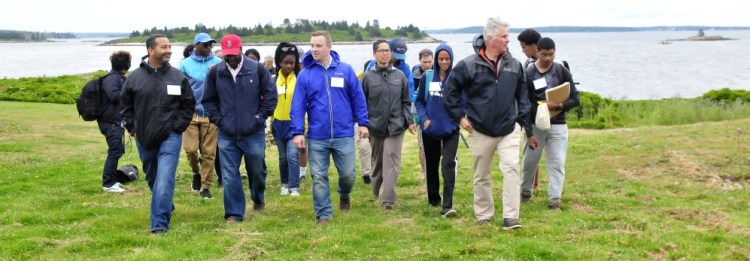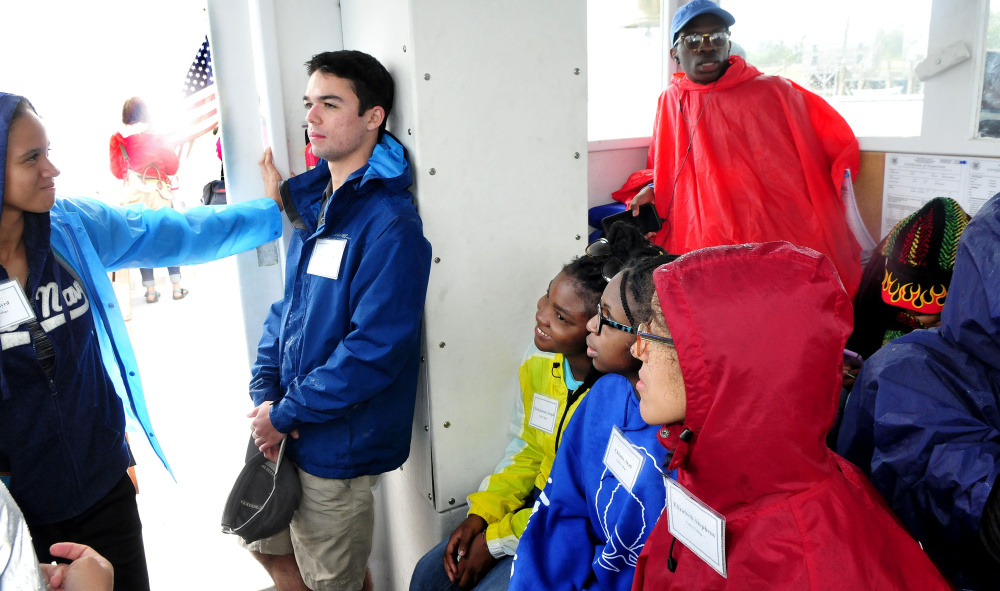ALLEN ISLAND — Three students ran across the windswept island, seeking shelter from the rain in one wooden structure, then another.
It was their first taste of island living in Maine, an experience brought to them by Colby College in Waterville, where they will start classes in the fall.
But the experience also came from the Up East Inc. foundation, brainchild of the Wyeth clan, the family of artists who, across three generations, have left an indelible mark on American art and, more recently, Maine’s island landscapes.
Over four days, the students helped Colby professors collect honeybees and frogs, examine geologic formations and test water temperature off Up East’s Allen Island, a rugged 450-acre living laboratory in Muscongus Bay. It’s part of a six-week program in which incoming Colby students with interest in the sciences get hands-on experience in fields ranging from computer science and geology to psychology, neuroscience and environmental biology.
“You get to explore your interests and filter out what you care about, what you don’t care about,” said Kayla Wesley, 17, of Brooklyn, New York. “We had a psychology module (last week), and now I know I want to major in psychology with a concentration in neuro, and it’s because of the module.”
Over the last year, Colby College and Up East have partnered to bring students new opportunities for hands-on, immersive learning on Allen Island and at the Herring Gut Learning Center, a nonprofit education center in Port Clyde that runs marine science and aquaculture programs for midcoast children and teenagers.
LONGTIME MODEL
The theory behind this kind of progressive education model dates back to John Dewey who, starting in the 1920s and ’30s, advocated for taking students out of Industrial Revolution-era classrooms and putting them into real-world environments to which they could relate better and that they were likely to encounter in their working lives. Dewey argued that students learn better when their education is tied to their lives and tailored to their interests and learning styles.
“A lot of more traditional forms of education are rote memory. It’s a banking concept of education,” said Adam Howard, a professor of education at Colby. “But it doesn’t work. You can deposit (knowledge), but they’re going to remember it about a hot minute, and then it’s not going to stick with them.”
Instead, Howard said, students retain more information when they are able to make connections. When educators work to cater to individual students’ existing knowledge, interests, learning styles and emotional and psychological development, those students are more likely to engage with and hold on to the material.
“You learn in deeper ways and more meaningful ways when you recognize all of the students’ needs and (meet) their needs, be it emotional, personal, academic,” Howard said.
On Thursday, a group of future Colby students and professors braved cold rain and blustery wind to observe some of the results of the school’s collaboration with the Wyeth clan. That includes climate and habitat monitoring outposts on Allen Island collecting real-time data on the temperature, salinity and – soon – carbon dioxide content of Muscongus Bay, which as part of the Gulf of Maine, is warming faster than 95 percent of all ocean bodies in the world.
That data, as well as information on wind direction and velocity, rainfall levels and ambient humidity, is being shared with local fishermen, climate scientists and other scientists around the world as Colby professors such as Whitney King, a professor of ocean and environmental chemistry, try to gauge the extent and effects of climate change on Maine’s waters.
King said the outpost provides invaluable data that can be used to inform Maine’s fishing industry and broader attempts to understand how the climate is continuing to change.
The island also provides an unparalleled training ground for the next generation of Maine’s scientists.
“Those kids are into it,” King said of the visiting students. “It makes them more competitive. It makes them curious. I think it makes them appreciate what they’ve got.”
LASTING PROJECTS
As part of the college’s collaboration with the Up East Foundation, all the programming that happens on Allen Island and Herring Gut also must give back to the island, the foundation or the St. George peninsula community, which professors saw as a benefit and learning experience in and of itself.
When American studies professor Benjamin Lisle took students to the island to study it and the surrounding area’s cultural geography and history, they built interactive digital timelines, maps and stories examining the island’s architecture and forestry. In addition to learning about what it’s like to live on islands in Maine and diving into the state’s lobstering history and culture, the students created lasting projects on the subjects.
Documentary professor Erin Murphy took her documentary video production students to the island, where they spent a night and day filming visual narratives about the island, including its local wildlife – the resident sheep population was a big hit – and, later, a local lobsterman. In addition to creating educational and artistic works about the island, Murphy said, the experience accelerated the students’ training and bonding.
“It was a really good chance to get to know the students in the class quicker,” Murphy said. “I was really sad when that class ended.”

Visitors from Colby College and others tour a vegetable greenhouse Thursday at the Herring Gut Learning Center in Port Clyde.
EDUCATION ACCESS
On shore, Colby students have begun working with the educators at Herring Gut who create hands-on learning experiences for midcoast students.
The center offers programs such as First Work Experience, which brings in middle school students to run the center’s aquaculture farm and to prepare and then sell the farm’s vegetables at a local farmers’ market. Students in the program learn to handle money and to interact and negotiate pricing with customers. The staff described the center’s overarching goal as creating learning experiences that engage students who might not thrive in traditional classroom settings.
“What we are about more than anything is that every student has access to an education that works for them,” said Peter Harris, chairman of the Herring Gut board of trustees.
TAILORED TO THEIR INTERESTS
At the heart of the center is an intensive three-year program that works with classes of 12 students to provide support, custom education suited to their interests and needs and a place to grow. The program provides hands-on experience with aquaculture while helping students develop emotional skills and confidence.
Staff members at the center recalled how many of the students in the program struggle to look adults in the eye when they get started. By the time they graduate, the students often have become leaders in their schools, delivering speeches at their eighth-grade graduations.
At a tour of the school Thursday, staff members recalled one student’s perspective on his own transformation.
“I like the person I am this year a lot more than the person I was last year,” he said.
David Greene, president of Colby College, hailed Herring Gut’s experiential approach as the kind of intervention that could make the difference between academic successes and failures that can follow students for the rest of their lives.
Greene noted that students who obtain their high school diplomas can expect to make nearly twice as much money as peers who fail to graduate from high school.
High school dropouts are five times more likely to be unemployed, Greene said, and are at significantly greater risk of incarceration.
“If you don’t catch those kids, they’re going to have a life that’s less than it could have been,” Greene said.
Kate McCormick can be contacted at 861-9218 or at:
kmccormick@centralmaine.com
Twitter: KateRMcCormick
Copy the Story LinkSend questions/comments to the editors.





Success. Please wait for the page to reload. If the page does not reload within 5 seconds, please refresh the page.
Enter your email and password to access comments.
Hi, to comment on stories you must . This profile is in addition to your subscription and website login.
Already have a commenting profile? .
Invalid username/password.
Please check your email to confirm and complete your registration.
Only subscribers are eligible to post comments. Please subscribe or login first for digital access. Here’s why.
Use the form below to reset your password. When you've submitted your account email, we will send an email with a reset code.